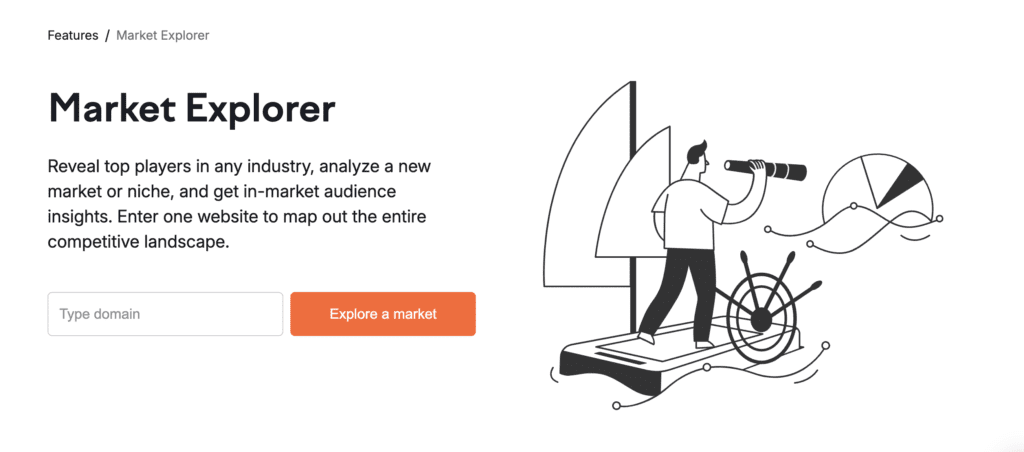7 Best AI Tools for Marketing Research Projects 2024
-
Odun Odubanjo
- 10 min read


Marketing research is the lifeblood that powers result-driven marketing. 91% of businesses agree that using marketing research data increases their sales, according to Hanover Research.
That figure has certainly gone up since AI tools have made it easier for companies to collate and analyze data. This clearly explains why the global market research industry reached nearly $130 billion in 2023, experiencing a 5% growth rate according to ESOMAR, with projections to surpass $140 billion by 2024.
AI tools have redefined the scope of marketing research, enabling teams to work smarter and uncover deep insights faster. From understanding customer behavior to predicting market trends,
AI has equipped businesses with enhanced capabilities that traditional research methods simply can’t match. With AI, companies can now rapidly process large volumes of data, allowing for faster and more accurate decision-making.
The big deal here is, marketing research holds immense strategic value but lacks efficiency at scale, hence the need to adopt advanced methods such as AI to automate the process. It’s insane how much AI has changed the world in the last couple of years and thankfully, the rapid advancement of AI technologies is transforming marketing research by automating data synthesis, spotting trends, and forecasting scenarios.
With market research AI tools, businesses can generate actionable insights that fuel more effective campaigns, product decisions, and customer engagement strategies. By automating the time-consuming aspects of data collection and analysis, these tools free up resources, enabling researchers to focus on interpretation and strategy.
We put together a list of the Best AI Tools for Marketing Research Projects in 2024, each offering unique capabilities to improve your research outcomes. From market analysis AI to AI-driven reporting, these tools offer various features designed to help teams understand customer needs, track trends, and optimize marketing strategies
What are AI marketing research tools?
AI marketing research tools are software solutions that use AI to automate and enhance various aspects of the market research process.
AI tools streamline these processes by automating data collection, analysis, and reporting, which are essential for keeping up with evolving consumer needs. As data sources diversify, AI’s role becomes even more critical for a comprehensive view of market dynamics
These market research AI tools use machine learning, natural language processing (NLP), and data mining techniques to extract meaningful patterns and trends from unstructured data, transforming them into actionable insights.
AI in marketing research has grown significantly, addressing pain points such as manual data analysis, data security concerns, and integration across platforms. Traditional research approaches often lack the agility needed in today’s fast-paced market. AI tools for market research are essential to staying relevant in a rapidly changing market.
7 Best AI Tools for Marketing Research Projects 2024
- Insight7: Qualitative Data Analysis
- ChatGPT: Content Research and Ideation
- Crayon: Competitive Insights
- SEMRush Market Explorer: Market Trend Analysis
- Browse AI: Web Data Extraction
- Algolia: Search & Recommendation API
- Brand24: Social Listening
1. Insight7
Insight7 is a user-friendly AI marketing research tool for analyzing interviews, conversation & calls at scale. It automatically extracts key themes, summary, insights, highlight and sentiment from up to 200 interviews at once enabling marketing research teams develop growth strategies, powerful messaging, relatable content, and ad copies.
Insight7’s ability to synthesize qualitative interviews enables businesses to gain a deep understanding of their target audience, thereby enhancing the efficacy of their marketing initiatives.
With Insight7, marketers and go-to-market teams can strategically align themselves, their messaging, content creation efforts, and advertising campaigns with the identified customer sentiments and preferences.
Features of Insight7
- Automated Qualitative Data Analysis: Insight7 enables users to upload and analyze large volumes of transcripts from interviews, focus groups, or customer feedback to inform data-driven decision-making. Insight7 helps users extract actionable insights by automatically identifying recurring themes, sentiments, trends, quotes and patterns across large datasets to drive business decisions.
- Automated Bulk Transcription & Translation: Insight7 provides automatic bulk transcription services for audio and video files in over 60+ languages. It translates content to English for analysis and then back to the original language, making global data analysis seamless.
- Comprehensive Reporting: Insight7 provides in-depth analysis and detailed reports, including advanced visualizations, tailored to the specific needs of various qualitative research methods, such as interviews and focus groups.
- Customizable Insight Deliverables: Users can create various reporting formats, such as journey maps, and user personas, allowing for insights to be presented in ways that meet specific project requirements.
- Enterprise-Grade Data Security: By adhering to GDPR and SOC2 compliance standards and utilizing secure AWS storage, Insight7 ensures that sensitive research data is kept safe and private.
- Project-Based Research Repository: The platform allows users to organize all research data into projects, facilitating easy tracking and management of insights across different initiatives.
- Collaboration and Sharing: Insight7 enhances team collaboration by enabling users to share insights, tag colleagues, and work together in real-time, promoting faster and more informed decision-making.
Insight7’s unique combination of qualitative analysis, secure data management, and reporting customization makes it one of the best AI tools for market research in 2024. Its tailored approach to handling qualitative data makes it ideal for organizations needing deep insights into consumer behavior and trends. Overall, Insight7 is a powerful ai tool for marketing research teams that want to gain deeper insights from interviews for a wide range of use cases.
Extract insights from interviews, calls, surveys and reviews for insights in minutes
2. ChatGPT
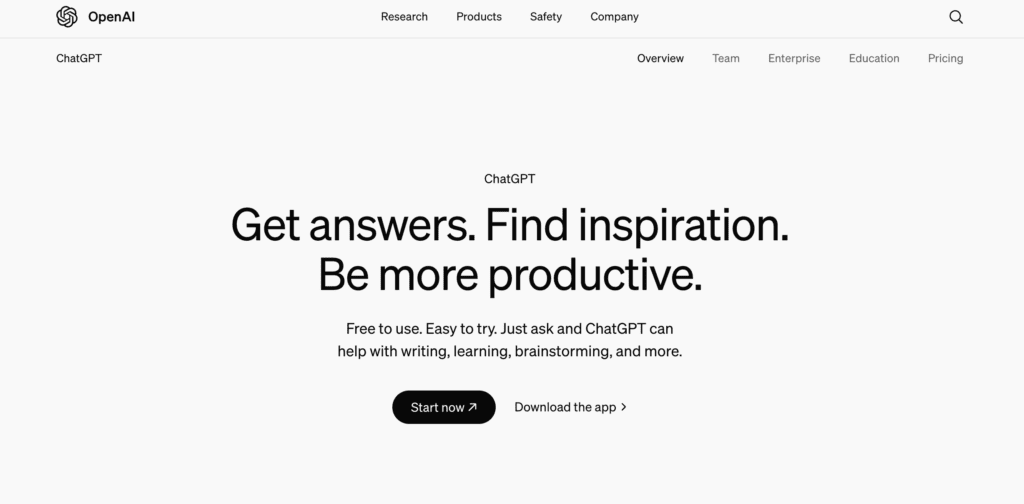 ChatGPT needs no introduction. This large language model by OpenAI can be used to facilitate seamless market research tasks amongst other tasks. It offers assistance in competitive analysis, consumer sentiment analysis, and trend identification, empowering businesses to anticipate market shifts and make proactive, informed decisions.
ChatGPT needs no introduction. This large language model by OpenAI can be used to facilitate seamless market research tasks amongst other tasks. It offers assistance in competitive analysis, consumer sentiment analysis, and trend identification, empowering businesses to anticipate market shifts and make proactive, informed decisions.
While it’s not a replacement for traditional methods, it offers unique capabilities that can enhance research efforts when used strategically. Here’s a detailed analysis of its strengths and limitations.
Features of ChatGPT
- Gathering Qualitative Data: ChatGPT excels at conducting open-ended conversations and simulating interviews or focus groups. It can probe for detailed opinions, motivations, and experiences from users, generating rich qualitative data.
- Generating Survey Questions: ChatGPT can help craft insightful and engaging survey questions by analyzing existing data and understanding target audiences. It can even personalize questions based on individual responses.
- Analyzing Text Data: ChatGPT can process large volumes of text data like social media posts, reviews, and customer feedback, identifying trends, sentiment analysis, and uncovering hidden insights.
- Creating Personas: By analyzing data about target demographics and behaviors, ChatGPT can generate detailed customer personas, aiding in understanding and empathizing with potential users.
- Brainstorming Ideas: ChatGPT can be a valuable brainstorming partner, suggesting creative marketing strategies, product concepts, and messaging based on its knowledge and understanding of the market.
Overall, ChatGPT is a powerful tool with significant potential for market research. However, its limitations require careful consideration and responsible usage. By understanding its strengths and weaknesses, researchers can leverage it effectively to gather valuable insights, generate ideas, and streamline research processes. As the technology continues to develop, its role in market research is likely to grow, but it’s crucial to use it ethically and responsibly alongside other established methods.
3. Crayon
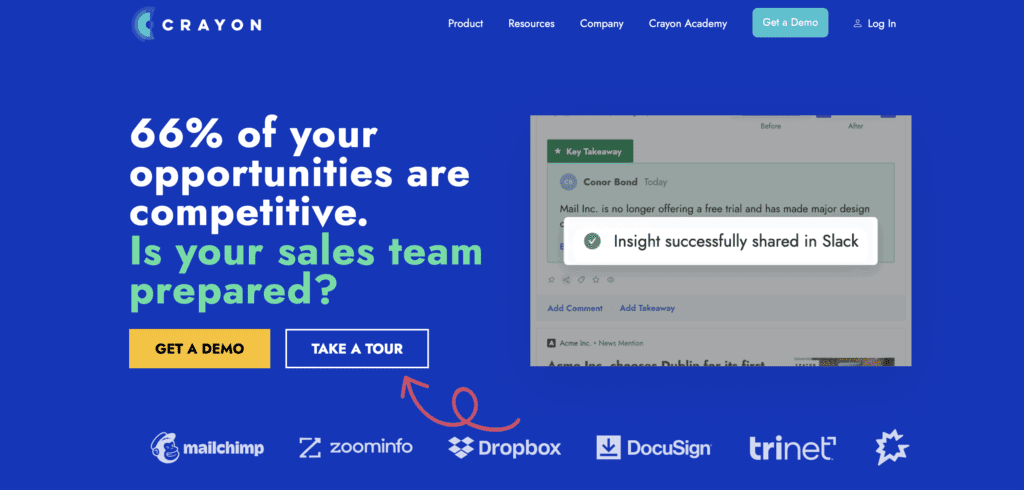 Crayon is an AI-powered competitive intelligence software, aiming to empower businesses with insights into their competitors. While it doesn’t strictly fall under the category of “marketing research,” its focus on competitor analysis makes it relevant for marketing teams seeking to understand the competitive landscape.
Crayon is an AI-powered competitive intelligence software, aiming to empower businesses with insights into their competitors. While it doesn’t strictly fall under the category of “marketing research,” its focus on competitor analysis makes it relevant for marketing teams seeking to understand the competitive landscape.
Features of Crayon
- Competitor Tracking: Crayon monitors various sources like websites, press releases, social media, and job postings to track competitors’ activities. It identifies key changes like product launches, pricing updates, and marketing campaigns.
- Automated Alerts: The platform proactively alerts users to relevant competitor intel based on their preferences and pre-defined rules. This helps you stay informed without manually sifting through information overload.
- Competitive Battlecards: Crayon generates battlecards summarizing competitor strengths, weaknesses, and key differentiators. This equips sales & marketing teams with valuable talking points for customer interactions.
- Market Research Insights: Crayon provides insights into market trends, competitor positioning, and customer sentiment. This information can inform strategic decision-making across various departments.
- Customizable Reports: Users can create custom reports focusing on specific competitors, industries, or topics, tailoring the information to their needs.
- Integrations: Crayon integrates with popular CRM, marketing automation, and sales enablement platforms, streamlining data flow and enhancing workflows.
Overall, Crayon is a powerful tool for competitive intelligence, offering extensive data collection, AI-powered analysis, and actionable insights. However, its limited scope, potential cost barriers, and data accuracy concerns need to be considered before making a decision. For businesses with a strong need for competitor intelligence and the budget to support it, Crayon can be a valuable asset in their marketing and sales efforts.
4. SEMRush Market Explorer
SEMrush Market Explorer is a powerful marketing tool that offers insights into industries, competitors, and audiences. Tailored for in-depth insights into market dynamics, Market Explorer uses a vast online database, offering a comprehensive understanding of the digital ecosystem. Users can analyze market trends, identify key players, and assess market shares. This tool is instrumental in uncovering opportunities and threats by providing detailed information on competitors’ online strategies, traffic sources, and audience demographics.
Features of SEMRush Market Explorer
- Market Overview: Identify key players, understand market size and growth, and analyze traffic trends.
- Competitive Analysis: Compare your website to rivals, discover hidden competitors, and assess their strengths and weaknesses.
- Audience Insights: Uncover demographics, interests, and online behavior of your target audience.
- Keyword Research: Analyze keyword volumes related to your niche, trends, and competition to optimize your SEO strategy.
- Customizable Reports: Generate reports tailored to your specific needs and download them for further analysis.
Overall, SEMrush Market Explorer is a valuable tool for marketers looking to gain insights into online markets, competitors, and audiences. While it has some limitations, its comprehensive data, actionable insights, and user-friendly interface make it a powerful weapon for businesses of all sizes.
5. Browse AI
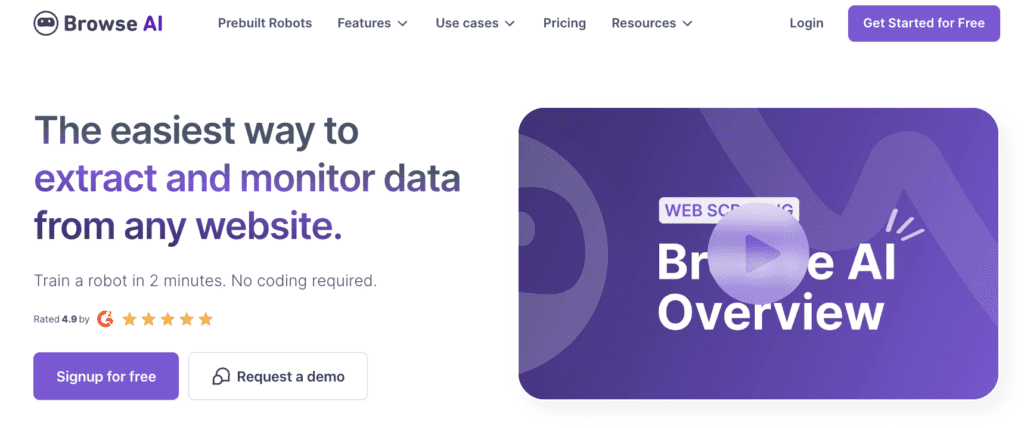 Specifically designed for automating data extraction from various platforms, including LinkedIn, Pinterest, Twitter, and ProductHunt. Browse AI simplifies the process of monitoring and gathering valuable information from different websites.
Specifically designed for automating data extraction from various platforms, including LinkedIn, Pinterest, Twitter, and ProductHunt. Browse AI simplifies the process of monitoring and gathering valuable information from different websites.
Features of Browse AI
- Web Data Extraction: Extract specific data points (text, numbers, images) from websites using selectors or custom code.
- Data Monitoring: Track changes on websites and receive alerts upon updates.
- No-Code Interface: Easy-to-use interface requires no coding knowledge.
- API Integration: Convert extracted data into an API for seamless integration with other tools.
- Chrome Extension: Extract data directly from web pages while browsing.
- Pre-built Templates: Use templates for common tasks like competitor analysis or product information extraction.
Overall, BrowseAI offers a valuable tool for automating data collection and monitoring within market research. While limitations exist in data analysis and ethical considerations, its user-friendly interface and scalability make it attractive for both technical and non-technical users.
6. Algolia
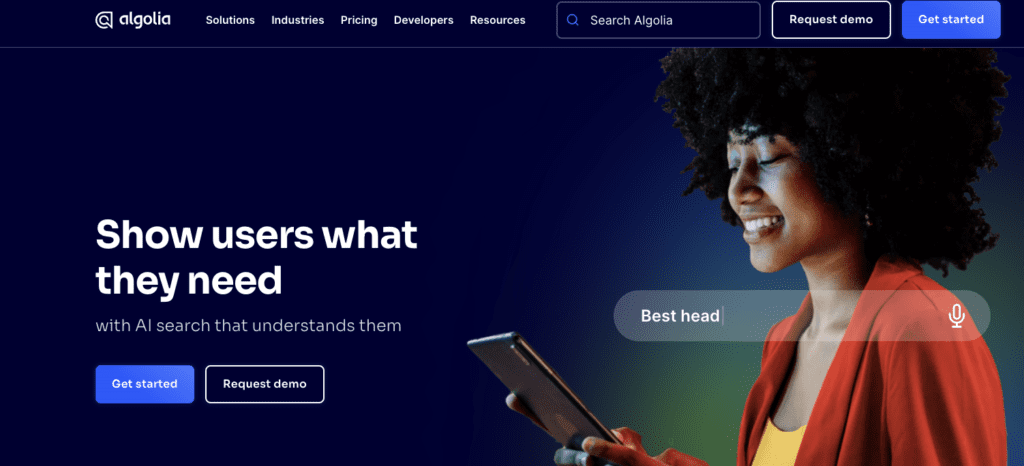 Algolia is a cloud-based marketing research platform that helps businesses gather and analyze customer data from a variety of sources, including online surveys, polls, social media, and website feedback. With features like typo-tolerance, instant search suggestions, and personalized recommendations, Algolia enhances user engagement. Its search-as-a-service model allows organizations to optimize search capabilities without extensive infrastructure management.
Algolia is a cloud-based marketing research platform that helps businesses gather and analyze customer data from a variety of sources, including online surveys, polls, social media, and website feedback. With features like typo-tolerance, instant search suggestions, and personalized recommendations, Algolia enhances user engagement. Its search-as-a-service model allows organizations to optimize search capabilities without extensive infrastructure management.
Features of Algolia
- Survey creation and distribution: Algolia provides a user-friendly interface for creating surveys and polls, and it offers a variety of distribution options, such as email, social media, and website pop-ups.
- Data collection and analysis: Algolia collects data from a variety of sources and stores it in a central location. It offers a variety of tools for analyzing data, such as charts, graphs, and reports.
- Reporting and insights: Algolia provides users with a variety of reports and insights that can help them understand their customers better. These reports can be used to identify trends, track customer sentiment, and measure the effectiveness of marketing campaigns.
Overall, Algolia is a user-friendly and affordable marketing research platform that offers a variety of features. However, it is important to be aware of its limitations before making a purchase.
7. Brand24
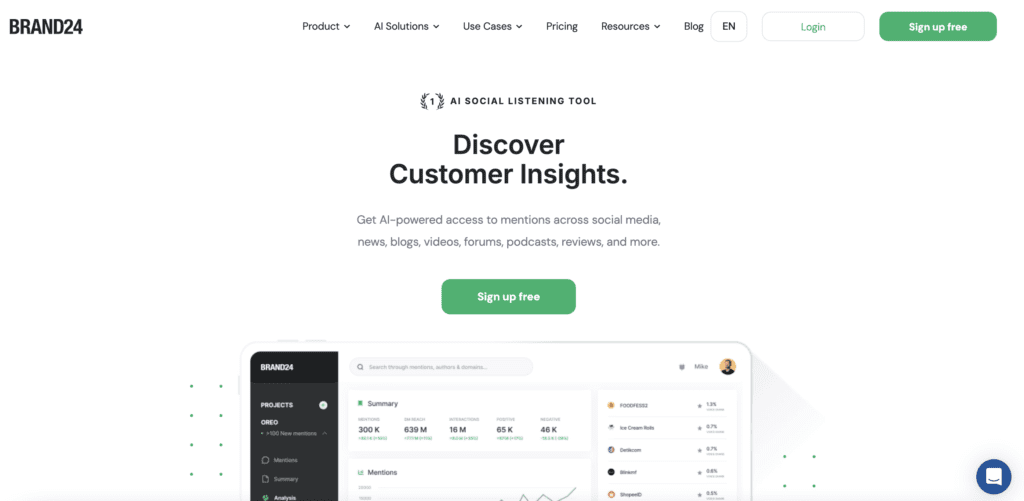 Brand24 is a prominent player in the media monitoring and social listening space, empowering businesses to track and analyze online conversations about their brand, competitors, and industry. It tracks mentions across various online platforms in real-time, providing valuable insights into brand perception. Users can conduct sentiment analysis, identify influencers, and manage potential crises. The platform’s intuitive dashboards, customizable reports, and competitive analysis features empower businesses to make data-driven decisions and engage effectively with their audience.
Brand24 is a prominent player in the media monitoring and social listening space, empowering businesses to track and analyze online conversations about their brand, competitors, and industry. It tracks mentions across various online platforms in real-time, providing valuable insights into brand perception. Users can conduct sentiment analysis, identify influencers, and manage potential crises. The platform’s intuitive dashboards, customizable reports, and competitive analysis features empower businesses to make data-driven decisions and engage effectively with their audience.
Features of Brand24
- Brand Mention Tracking: Monitor mentions across diverse platforms like social media, news websites, blogs, forums, podcasts, and more.
- Sentiment Analysis: Gauge the positive, negative, or neutral sentiment associated with mentions.
- Influencer Identification: Discover individuals with significant impact on conversations about your brand or industry.
- Competitive Intelligence: Track competitors’ mentions, strategies, and performance metrics.
- Reporting & Analytics: Generate comprehensive reports with charts, graphs, and key insights.
- Customizable Alerts: Receive real-time notifications for relevant mentions.
- API Access: Integrate Brand24 data with other marketing tools for seamless workflows.
Overall, Brand24 is a powerful tool for social listening and brand monitoring. However, its suitability for marketing research depends on your specific needs and budget. If you need a comprehensive platform to track online conversations and gain insights into your brand and competitors, Brand24 is worth considering.
AI Marketing Research Tools: Table Overview
| Tool | Description | Key Features |
|---|---|---|
| Insight7 | Qualitative data analysis for interviews. | Automated analysis, bulk transcription, secure reporting. |
| ChatGPT | Language model for enhancing market research tasks. | Simulated interviews, survey generation, text analysis. |
| Crayon | Competitive intelligence tool for tracking rivals. | Competitor monitoring, alerts, battlecards. |
| SEMRush Market Explorer | Insights into market trends and competitor strategies. | Market overview, audience insights, keyword analysis. |
| Browse AI | Automates web data extraction. | Data extraction, no-code interface, monitoring. |
| Algolia | AI search & discovery platform | Search tools, data analysis, reporting. |
| Brand24 | Social listening for tracking brand conversations. | Mention tracking, sentiment analysis, influencer identification. |
Why you should use AI marketing research tools in your 2024 projects
Research shows that about 94% of business leaders view AI as crucial for success within the next five years. This clearly indicates that any marketing team or professional that does not adopt the use of AI in research would be missing out on good chances of success and scaling at speed…
Here are some of the key benefits of using AI marketing research tools:
- Faster and more efficient:AI can automate many tasks that are traditionally time-consuming and labor-intensive, such as data collection, cleaning, and analysis. For example, capabilities like natural language provide instant theme analysis of open-ended survey responses and predictive engines foresee segment-specific outcomes to guide budget allocations.
- More accurate and insightful: AI can help you identify patterns and trends that you might miss with traditional methods, and it can do so with a high degree of accuracy. This can lead to more accurate and insightful results that can help you make better decisions.
- Deeper understanding of your customers: AI can help you segment your customers and understand their needs and preferences in more detail. By analyzing customer feedback and behavior, market conditions, market share and viability products, you can help your business reduce risk around marketing activities.
- More scalable: AI tools can handle large amounts of data, which makes them ideal for conducting research on a large scale. This can be helpful for businesses that operate in multiple markets or have a large customer base.
So whether you’re a seasoned researcher or just starting your journey in marketing research, this list should equip you with the knowledge and tools to bring your A-game to the next marketing research project.
Wrapping up…
This is not an exhaustive list, and the best tools for you will depend on your specific needs and budget. While AI tools can be incredibly valuable, it is crucial to choose the right ones for your specific marketing research needs, ask the right questions, and carefully interpret the results.
Quality decisions stem from insights derived from your research, and tools that excel in this area can be particularly beneficial. One such tool worth exploring is Insight7, which specializes in transforming data into actionable insights. Sign up for free today!
Analyze & Evaluate Calls. At Scale.




